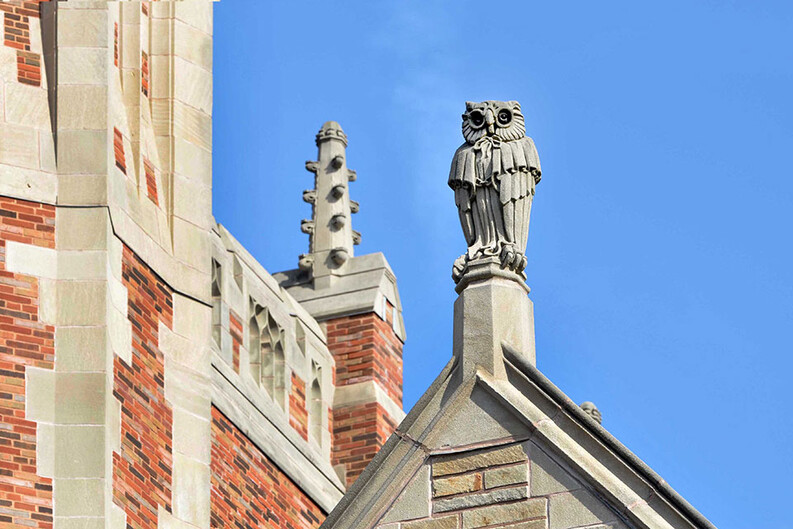LEAP Student Researcher Meredith Barges Builds a Safer World for Birds

Meredith Barges ’23 MDiv came to Yale to study theology and become a hospital chaplain. But after only a few weeks on campus, she became involved in student organizing to help make the Yale School of Management’s Edward P. Evans Hall more bird-friendly. Since then, her advocacy has expanded to include state-level organizing and research on city bird-friendly building policies with the Law, Ethics & Animals Program (LEAP)4 at Yale Law School.
“It feels like every window, door, and gate to doing bird advocacy has opened to me since I started at Yale,” Barges said. “I thought hospital patients were going to be my population, but as it turns out, it’s birds.”

With many bird species in steep decline, the future of birds in the United States is in peril. In 2019, scientists estimated that North America has lost 3 billion birds since the 1970s5. The reasons for these losses are complex, but threats include habitat loss, invasive species, pesticide use, climate change, cats, and window collisions. The majority of migratory birds fly at night, and scientists believe that birds use the light of the moon and stars to navigate. Artificial lighting from buildings and street lights can disorient them, leaving them exhausted and more vulnerable to window collisions and other threats.
To help address this crisis, Barges co-founded Lights Out Connecticut6 with Craig Repasz, Yale College ’00, a non-profit project of the Connecticut Ornithological Association in February 2022. Their statewide campaign encourages residents to turn off their non-essential lights during peak bird migration to reduce bird mortalities at home and in their businesses, schools, and churches.
“We need Lights Out here in Connecticut. We’re on the Atlantic Flyway, so millions of migratory birds fly through our state each spring and fall, over all of our lit-up cities, ” Barges said. “Dimming our lights would mean so much for birds.”
Co-founding this organization is an extension of Barges’s bird advocacy and research at Yale. In 2021, Barges spearheaded efforts to convince Yale Divinity School to become a Lights Out participant7. By joining the program, Yale Divinity School pledged to ensure that all unnecessary lights are turned off after 11 p.m. each night during migration seasons and to help raise awareness about the harms of light pollution for birds on campus. As a 2022 LEAP Student Grant recipient8, Barges received funding to investigate and advocate for bird-friendly changes to Yale policies, including reducing unnecessary lighting during peak bird migration, ceasing use of second-generation anticoagulant rodenticides that can kill birds of prey, and helping to inspire an appreciation of birds in the Yale community.
“Meredith is a force of nature,” LEAP Executive Director Viveca Morris said. “She is a brilliant, extraordinarily talented, and much-needed advocate for protecting Connecticut’s birds from the multitude of threats they face. The birds — and the rest of us who love them and depend on them for a multitude of ecological services — are fortunate to have her in their corner.”

Barges and Repasz initially envisioned starting a Lights Out campaign at the city level in New Haven. But with some encouragement from local Audubon chapters, they saw an opportunity to expand their efforts. This year, the Connecticut General Assembly is considering a bill that would require all state-owned and -leased buildings in Connecticut to participate in Lights Out, including state universities and community colleges. On Feb. 15, Barges joined dozens of bird advocates in Hartford, including Morris and Repasz, to testify before the Connecticut General Assembly’s Environmental Committee on behalf of migratory birds in Connecticut.
To build public awareness and participation, Lights Out Connecticut launched the Lights Out CT Pledge9. By signing the pledge, community members commit to minimizing unnecessary lights and making seasonal lighting changes during peak spring and fall bird migrations. “The pledge is meant to instill a sense of local empowerment about daily changes they can make that will help save the lives of thousands of migratory birds,” Barges said.
While Lights Out Connecticut focuses specifically on reducing light pollution to protect birds, Barges also studies the effectiveness of public policy strategies for accelerating the adoption of bird-friendly design as part of LEAP’s Yale Bird-Friendly Building Initiative10. Working with Morris, Barges is drafting a report examining existing bird-friendly building design policies in U.S. cities and how public policy strategies can advance the development and use of bird-friendly design, technologies, practices, and materials at both new and existing buildings.
“Working on the LEAP report has expanded my view of what still remains to be done for birds,” Barges said. "Foremost, people need to be moved to care about birds and to know their role in healthy ecosystems. So, my main goal is probably to help people to see the beauty and value in the birds around us.”


